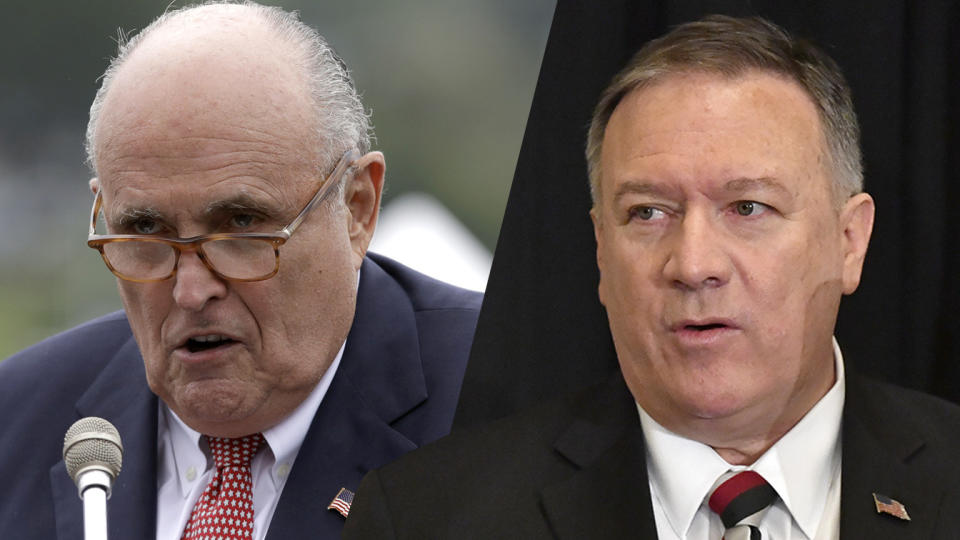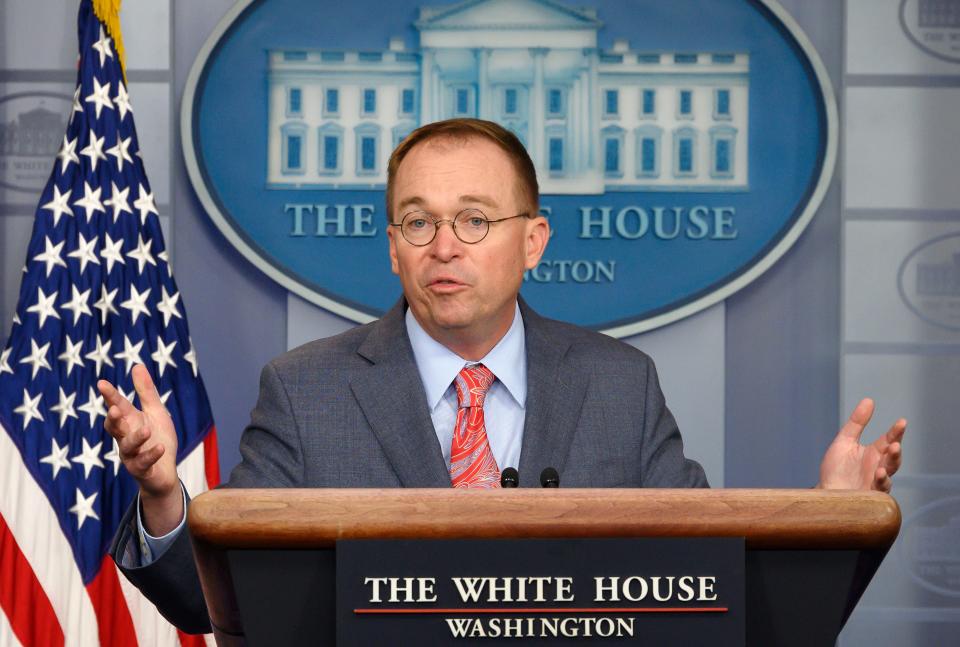State Department pressured to turn over impeachment documents from potential Giuliani-Pompeo call
WASHINGTON — As Congress weighs evidence in an impeachment investigation into President Trump, a government transparency organization is using the court system to accelerate the release of documents that could prove critical to that probe.
The organization, American Oversight, has already won the release of 100 pages of State Department documents relevant to the impeachment inquiry. In a court hearing on Tuesday, its attorneys pressed for a second round of revelations. This time, however, the watchdog group — which has been consistently critical of the Trump administration — stripped the request down to what it apparently believes are the most promising search terms.
If honored, that search request could provide a significant boost to House Democrats who are currently conducting an impeachment inquiry into Trump’s alleged scheme to pressure Ukrainian President Volodymyr Zelensky to investigate a Democratic rival. The Democrats have also charged the White House with obstructing that investigation by refusing to release documents requested by Congress.

That refusal leaves lawsuits, like the one filed by American Oversight, as a potential alternative route for obtaining the records Congress seeks.
Speaking after what appeared to be an auspicious hearing before the U.S. District Court for the District of Columbia on Tuesday afternoon, American Oversight Executive Chairman Austin Evers said that his efforts were independent of those taking place on Capitol Hill. At the same time, he recognized that a timely release of Ukraine-related documents could bolster the case against Trump.
“We can’t bind the court to the impeachment timetable,” Evers said after the hearing. “But I don’t think it’s lost on anybody.”
Tuesday’s hearing was an opportunity for American Oversight to narrow its longstanding request for documents relating to political influence on dealings with Ukraine. Specifically, the new request targets interactions between high-ranking Trump political appointees and Kurt Volker, the former special envoy to Ukraine, and Gordon Sondland, the U.S. ambassador to the United Nations, two of the “three amigos” thought to have at least partly participated in those efforts.
The third amigo was Rudy Giuliani, the former New York mayor and currently Trump’s personal lawyer. The new document request includes any notes pertaining to a potential Sept. 11 call between Giuliani and Secretary of State Mike Pompeo. The date of the purported call is significant because on that same day, the Trump administration released $250 million in aid to Ukraine, despite Zelensky never having launched the political investigations Trump allegedly demanded in exchange for the funds.
American Oversight filed its initial document request in May, long before the impeachment inquiry began. The impetus for the original request was the abrupt firing of Marie Yovanovitch, then-U.S. ambassador to Ukraine.

Though the reason for the firing was not then clear, Yovanovitch recently testified that Giuliani regarded her as an impediment to his influence efforts in Kyiv.
During a Tuesday hearing in D.C. District Court, Judge Christopher Cooper appeared broadly amenable to American Oversight’s demands, as he has been in the past. Cooper oversaw an initial release of State Department documents to American Oversight. Those documents added significant detail to the narrative of a foreign policy apparatus that appears to have been undermined by Giuliani’s “irregular channel” of diplomacy, as one impeachment witness deemed his efforts.
Evers of American Oversight praised Tuesday’s hearing as “incremental progress towards transparency,” adding that litigation was necessary because the Trump administration has steadfastly refused to cooperate with the impeachment inquiry led by congressional Democrats. “I don’t know what they’re afraid of,” Evers said.
The White House has refused all document requests made by House Democrats. The State Department, however, may have no choice but to comply with American Oversight’s request, depending on what the judge decides.
“While these documents are potentially subject to the assertion of certain privileges — such as executive privilege — the State Department may nonetheless face very real challenges in trying to withhold the documents,” current Georgetown constitutional scholar and former Obama administration National Security Council attorney Joshua A. Geltzer explained to Yahoo News.
Yet the president’s own tweets, and officials’ public discussion, like acting White House chief of staff Mick Mulvaney’s catastrophic press conference in October, may end up working against the administration’s attempts to block release of the records.

Geltzer said the Trump administration’s public comments on the issues could be interpreted by the court as a waiver of privilege. “And even if portions of documents are ultimately withheld, just seeing exactly who communicated about these matters, and when, could be new and valuable — and those aspects of the documents are unlikely to be privileged or otherwise withholdable,” he added.
The State Department did not respond to a request for comment.
During the Tuesday hearing, attorneys for American Oversight said that they specifically wanted any evidence of interactions between State Department employees and Sondland and Volker. They cited testimony from Sondland before the House Intelligence Committee in which the ambassador said he kept Pompeo and his deputies apprised of the pressure campaign — even as he began to grasp that the campaign was improper.
The request for communications involving Sondland and Volker comes within an ongoing request from American Oversight for State Department documents pertaining to the impeachment inquiry.
The narrowed requests also includes any State Department memorialization of the July 25 phone call between Trump and Zelensky, in which Trump appeared to tie the prospect of military aid to Ukraine into his political rivals, including the Biden family. That call later became the basis for a whistleblower complaint to the inspector general of the intelligence community, which then led to the impeachment inquiry.
Perhaps most intriguing is a request of any records of a call between Giuliani and Pompeo. Though that call is known to have taken place, no notes or transcripts from it have been made public. Pompeo has meticulously tried to distance himself from the impeachment inquiry, a stance complicated by multiple witnesses asserting that he was aware of, and involved in, Giuliani’s efforts.
Government attorneys during Tuesday’s hearings described the records requests to the State Department as “truly demanding.” The new search terms presented by American Oversight would prove a “substantial taxation” on State Department resources, they argued.
Despite that, the State Department is expected to comply with the court’s decision, potentially strengthening Democrats’ case against Trump.
_____
Download the Yahoo News app to customize your experience.
Read more from Yahoo News:

 Yahoo Finance
Yahoo Finance 


